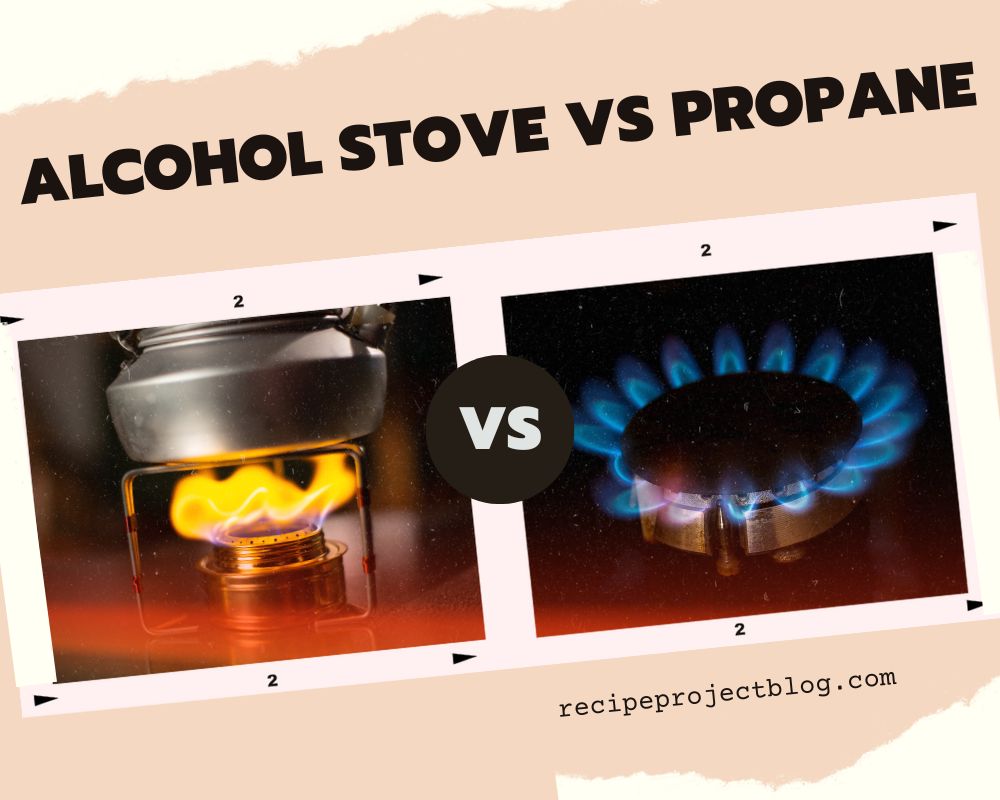Alcohol Stove vs Propane: Best Camp Cook Choice

Alcohol stove vs propane. When planning your outdoor adventures, having the right camping stove is essential for enjoyable and efficient cooking. The age-old debate between alcohol stoves and propane stoves continues to spark discussions among camping enthusiasts. Both options have unique advantages and disadvantages, making it crucial to weigh the key factors to determine the perfect fit for your outdoor cooking needs.
We will compare alcohol stoves and propane stoves in terms of fuel efficiency, portability, ease of use, environmental impact, cooking performance, cost analysis, safety, and user reviews. By the end of this guide, you’ll be equipped with the knowledge to decide which camp cook stove is right for you.
Table of Contents
Understanding the Basics of Camping Stoves
When choosing a camp cook stove, it’s essential to understand the basics of alcohol stoves and propane stoves. By delving into the functionality of these stoves and determining your camping style and stove needs, you can make an informed decision that aligns with your outdoor cooking preferences.
The Functionality of Alcohol Stoves
Alcohol stoves rely on denatured alcohol as their fuel source, making them popular among outdoor enthusiasts. These stoves feature a simple design that allows for easy assembly and disassembly. With their lightweight and compact nature, alcohol stoves are ideal for backpacking or minimalist camping. Whether simmering a delicate sauce or boiling water for coffee, alcohol stoves offer versatility and control in your camp cooking endeavors.
How Propane Stoves Operate in Outdoor Settings
On the other hand, propane stoves utilize propane gas canisters to fuel their cooking power. These stoves often come with a built-in burner and regulator, providing precise temperature control for your outdoor culinary creations. While propane stoves may be larger and heavier than their alcohol stove counterparts, recent advancements have led to the availability of lightweight and portable propane stoves, offering a viable alternative for campers seeking convenience and performance.
Determining Your Camping Style and Stove Needs
Understanding your camping style and specific stove needs is crucial in selecting the right camp cookstoves. If you’re a minimalist backpacker or prioritize lightweight gear, an alcohol stove may be the perfect fit for your adventures. Conversely, a propane stove might be more suitable if you value instant heat, fast cooking times, and the ability to handle larger cookware. Consider factors such as fuel availability, cooking preferences, and the overall camping experience you desire when selecting your stove.
Alcohol Stove vs Propane: Weighing Fuel Efficiency

Fuel efficiency is a crucial consideration when choosing a camp cook stove. In this section, we will analyze the fuel consumption of alcohol stoves and assess the fuel economy of propane stoves to help you make an informed decision.
Analyzing Alcohol Stove Fuel Consumption
Alcohol stoves are known for their slower burn rate, making them less fuel-efficient than propane stoves. The slower burn rate means alcohol stoves may consume more fuel to achieve a desired cooking temperature or boil water. However, it’s important to note that alcohol stoves often utilize renewable and easily available fuel sources, such as denatured alcohol, which can offset their relatively higher consumption. This environmental aspect is important for those who prioritize sustainability in their camping adventures.
Assessing Propane Stove Fuel Economy
Propane stoves offer higher heat output and faster cooking times, which can result in potentially lower fuel consumption. The efficient combustion of propane gas allows for greater heat transfer to the cooking vessel, ensuring quicker cooking times and reducing the overall fuel requirement. Propane stoves are particularly advantageous when cooking for larger groups or when time is limited.
Comparing the fuel consumption of alcohol stoves and the fuel economy of propane stoves is essential in choosing the stove that best meets your camping needs. Below, we present a table that summarizes the fuel efficiency of both stove types based on real-world data and user feedback.
| Stove Type | Fuel Efficiency |
|---|---|
| Alcohol Stove | Varies depending on the specific model and fuel source. |
| Propane Stove | Generally more fuel-efficient due to higher heat output and faster cooking times. |
The table shows that fuel efficiency can vary depending on the specific alcohol stove model and fuel source used. Propane stoves have greater fuel efficiency due to their higher heat output and faster cooking times. However, it’s important to consider other factors, such as the availability and cost of fuel sources, when making your decision.
Comparing the Portability of Alcohol and Propane Stoves
Regarding camping, portability is vital to consider in your cook stove choice. Alcohol stoves are known for their compact and lightweight designs, making them highly portable and suitable for backpacking or minimalist camping. These stoves are easy to carry and take up minimal space in your camping gear. Their lightweight nature allows for effortless transportation, enabling you to enjoy outdoor cooking wherever you go.
On the other hand, propane stoves, due to the gas canister and additional components, are usually larger and heavier than alcohol stoves. However, technological advancements have led to the availability of lightweight and portable propane stoves that offer a viable alternative to alcohol stoves. These modern stoves are designed to prioritize portability while still delivering high-performance cooking capabilities.
Comparing the portability of alcohol stoves and propane stoves will help you choose the stove that perfectly fits your camping needs and preferences. Whether you prioritize the ultra-portability and compactness of alcohol stoves or the convenience and improved performance of portable propane stoves, finding the right balance between portability and functionality is essential for a successful camping experience.
| Stove Type | Portability | Weight | Size |
|---|---|---|---|
| Alcohol Stoves | Highly portable | Lightweight | Compact |
| Propane Stoves | Lightweight and portable options available | Varies by model | Varies by model |
Ease of Use: Alcohol Stove and Propane Stove Face-Off
When you’re out camping and looking for convenient cooking options, ease of use is crucial. Let’s compare the ease of use between alcohol stoves and propane stoves to help you determine which stove suits your camping style and cooking preferences.
Alcohol Stoves:
- Easy Set-Up: Alcohol stoves are generally straightforward to assemble and operate, requiring minimal effort and time.
- Minimal Maintenance: These stoves have a simple design, making them easy to clean and maintain.
- Compatibility: Alcohol stoves are compatible with various types of camping cookware, allowing you to use your preferred pots and pans.
- Flame Control: The flame intensity of alcohol stoves can be easily adjusted, giving you the flexibility to simmer or cook at different temperatures.
- Safety: Alcohol stoves are generally safe, with easily controlled flames that can be extinguished quickly.
Propane Stoves:
- Instant Heat: Propane stoves offer instant heat, allowing you to start cooking quickly without any waiting time.
- Easy Ignition: These stoves are designed for easy ignition, usually featuring a built-in ignition system for hassle-free operation.
- Maintenance Requirements: To ensure optimal performance, propane stoves may require additional maintenance, such as cleaning the burner and ensuring proper gas flow.
- Compatibility: Propane stoves are also compatible with a wide range of camping cookware, providing versatility in your cooking options.
- Safety: While propane stoves are generally safe, taking precautions regarding flame control and stove stability is important, especially in outdoor settings.
In summary, both alcohol stoves and propane stoves have advantages and considerations regarding ease of use. Alcohol stoves offer easy set-up, minimal maintenance, compatibility with different cookware, and adjustable flame control. Propane stoves provide instant heat, easy ignition, and compatibility with various cookware but may require additional maintenance. Consider your camping style and cooking preferences to choose the stove that suits you best.
Alcohol Stove vs Propane: Environmental Considerations

As outdoor enthusiasts, we must consider the environmental impact of our camping gear. When comparing alcohol stoves and propane stoves, one crucial factor to evaluate is their eco-friendliness.
The Eco-Friendliness of Alcohol Stove Fuel
Alcohol stoves are known for using renewable fuel sources such as denatured alcohol. This eco-friendly choice reduces our reliance on non-renewable fossil fuels and contributes to a more sustainable camping experience. By opting for alcohol stove fuel, you can minimize your carbon footprint and decrease greenhouse gas emissions. This makes alcohol stoves a more environmentally conscious option compared to propane stoves.
Propane Stove and Its Environmental Impact
On the other hand, propane stoves rely on non-renewable fossil fuel sources, contributing to increased greenhouse gas emissions during combustion. The extraction, production, and transportation of propane gas canisters also have an ecological impact. The carbon emissions of propane stoves make them less eco-friendly than alcohol ones.
By considering the eco-friendliness of alcohol stove fuel and the environmental impact of propane stoves, you can make a conscious choice that aligns with your commitment to the environment. Opting for an alcohol stove can contribute to sustainable outdoor cooking practices and reduce your environmental footprint.
Cooking Performance: Alcohol Stove vs Propane
Cooking performance is a crucial factor to consider when choosing a camp cook stove. The alcohol and propane stoves offer different heat outputs and temperature control options, which can significantly impact your cooking experience. Here’s a comparison of how these stoves perform:
Alcohol Stove:
The alcohol stove provides a slower and more controlled heat output, ideal for simmering and delicate cooking. Its ability to maintain a consistently low flame makes it suitable for preparing gourmet meals outdoors. However, it may take longer to bring water to a boil compared to a propane stove.
Propane Stove:
The propane stove offers instant high heat output, allowing faster cooking times. It excels in quickly boiling water and handling larger cookware, making it suitable for larger groups or when time is limited. Its precision temperature control lets you adjust the flame intensity according to your cooking needs.
When considering the cooking performance of alcohol and propane stoves, it’s important to assess your specific cooking requirements and preferences. If you prioritize simmering and delicate cooking, an alcohol stove may be the better option. However, a propane stove would be more suitable if faster cooking times and the ability to handle larger cookware are essential.
Cost Analysis: Upfront and Long-Term Expenses
Initial Investment in Alcohol vs Propane Stoves
The initial investment is an important factor to evaluate when considering the cost of camp cook stoves. Alcohol stoves generally have a lower upfront cost compared to propane stoves. This is because alcohol stoves have a simpler design and do not require specialized components. On the other hand, propane stoves may have a higher initial investment due to the cost of the stove itself and the necessary gas canisters.
Recurring Costs of Fuel and Maintenance
While upfront expenses are a significant consideration, it’s also crucial to assess the long-term costs associated with alcohol stoves and propane stoves. Alcohol stoves tend to have higher recurring costs due to the expense of alcohol fuel, which can be more expensive than propane in the long run. Additionally, maintenance costs should be taken into account. Alcohol and propane stoves may require occasional maintenance, such as cleaning and replacing parts as needed.
Safety First: Which Stove is Safer for Camp Cooking?
Safety should always be a top priority when it comes to camp cooking. Let’s compare the safety aspects of alcohol and propane stoves to ensure a worry-free camping experience.
Alcohol stoves are generally considered safe to use. Their flame is easily controlled, allowing for precise cooking temperatures, and can be extinguished quickly. In addition, alcohol stoves have a lower risk of explosion than propane stoves.
Propane stoves, when used correctly, can also be safe. However, taking precautions regarding proper gas flow, flame control, and stove stability is important. Ensuring a steady and manageable flame prevents accidents or injuries while cooking.
By assessing the safety aspects of both alcohol stoves and propane stoves, you can make an informed decision and choose a camp cook stove that prioritizes your safety and the safety of those around you.
Alcohol Stove vs Propane: User Reviews and Feedback
Gauging User Satisfaction: Alcohol Stove Experiences
Hearing from other outdoor enthusiasts can provide valuable insights when choosing the right camp cookstoves. Alcohol stove experiences allow you to gauge user satisfaction and understand the real-world performance of these stoves. Reading user reviews and feedback gives you a sense of the reliability, ease of use, and cooking performance of alcohol stoves. Campers appreciate the simplicity and portability of alcohol stoves, making them ideal for backpacking and minimalist camping. Users often mention the convenience of using readily available denatured alcohol as fuel and the ability to control the flame intensity for precise cooking.
Collecting Insights on Propane Stove Use in the Wild
When considering propane stoves, gathering insights into their use in real camping scenarios is important. Propane stove user reviews and feedback offer valuable information on these stoves’ performance, durability, and overall satisfaction. Campers who opt for propane stoves highlight their fast heating ability and instant high heat output, allowing quick cooking times. Users often appreciate the convenience of propane canisters and the ease of ignition. However, some reviewers mention the importance of proper gas flow and handling to ensure safety and optimal performance.


